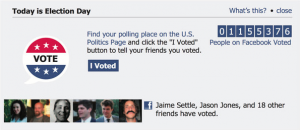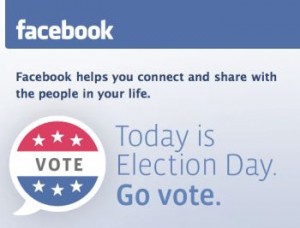“The online world and the real world affect one another”
Today, most people are dependent on the Internet. For teenagers and college kids, one day without their smart phone is like a disaster. We need constant access to the Internet, e-mail, and the ability to text. I mean if we do not have around the clock Internet access, how can we be on social networking sites such as Facebook and Twitter? It is amazing how much the Internet has come to affect the real world.
John Markoff discusses in the The New York Times article “Social Networks Can Affect Voter Turnout, Study Says” how the social networking website Facebook influenced more people to vote in the 2010 elections. A study conducted by Facebook and the University of California, San Diego found that “a special “get out the vote” message, showing each user pictures of friends who said they had already voted [pictured below], generated 340,000 additional votes nationwide.”
The experiment looked at 2 groups each consisting of 600,000 Facebook members. One group had the “get out the vote” message on the top of the site’s news feed, while the other group had no voting message at all. The scientists then compared actual turnout between the 2 groups to public voter rolls.
“They determined that the message showing friends who had voted was directly responsible for 60,000 more votes nationwide and indirectly responsible for 280,000 that were spurred by friends of friends.”
I don’t know about you, but I think that is unbelievable! We discussed in class how being in a social network affects your decisions, as it gives you an opportunity to copy or imitate the decisions of others. By informing users that many of their friends had voted, and even some specific friends, Facebook created an information cascade. A information cascade is a long sequence of people all making the same decision, regardless of whether their own information supports it. In this instance, the decision people have to make is whether or not to vote, while their own information is outside factors, such as whether or not their parents voted or encouraged them to vote. Given that voter turnout in the US is often relatively low given the size of the voting age population (in 2010 only about 90.7 million people voted, which is about 37.8% of the voting age population), I think this cascade was pretty significant. It truly illustrates the power of social networking (websites) and I am anxious to see how it affects future elections. It is interesting to think that as elections can be very close in swing states, social networking could impact which candidate wins a specific state and maybe even the entire presidential election.
The study also looked more specifically at how/if the strength of relationships between Facebook friends was correlated with how likely it would cause a person to vote. It found that friends with “strong ties,” or 2 people that are close friends, tended to be more influential on each other than those who had “weak ties,” which are 2 people who have a distant friendship. This makes sense for 2 reasons, one being that however Facebook/the study classified friendships as strong or weak was likely related to the activity between 2 friends. Closer friends are more likely to write on each others walls and be tagged in pictures together. In addition, good friends are more likely to look at each others walls and come up on each others news feeds. This means that if person X and person Y are close friends, there is a better chance that person Y will find out that person X voted since it is more likely that person Y’s news feed will illustrate that person X voted and/or that person Y will go to person X’s wall and see that person X voted. In addition, if you know your best friend (with whom you have “strong ties”) voted, its more likely to cause you to vote than if someone you were friends with 10 years ago and rarely speak to now (with whom you have “weak ties”) says they voted.
I absolutely agree with James H. Fowler, a professor of medical genetics and political science at the university, when he said that “What we have shown here is that the online world and the real world affect one another.” As I myself am a user of Facebook and am affected by social networks all the time, I am intrigued to see how networks continue to shape the world.
-BigRED (Disclaimer: This is not a political statement, just school spirit.)


